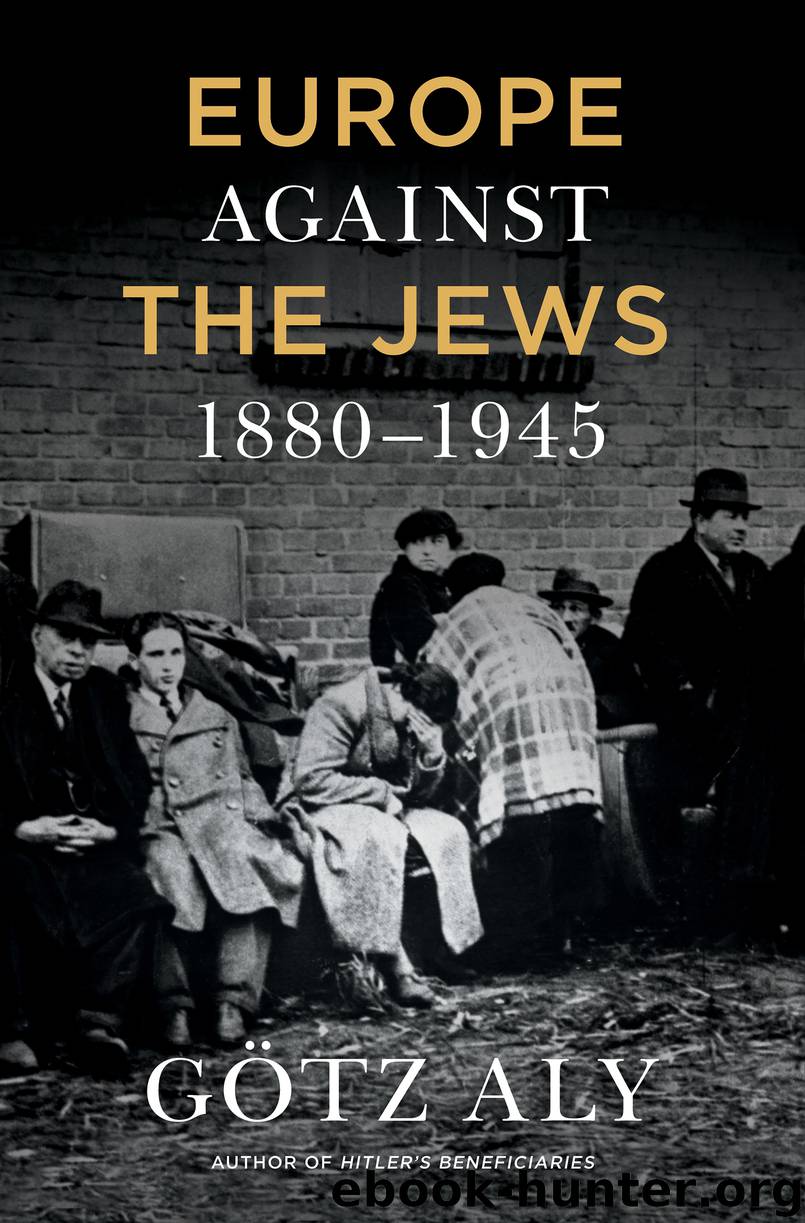Europe Against the Jews, 1880-1945 by Götz Aly

Author:Götz Aly
Language: eng
Format: epub
Publisher: Henry Holt and Co.
POLISH NATIONALISTS IN ACTION
At the 1815 Congress of Vienna, international diplomats created what came to be known as “Congress Poland,” a truncated protectorate state under Russian control. They declared Warsaw the capital and the Russian tsar the Polish king. The idea was to head off Polish desires for liberty while giving cities and communities limited autonomy. Within this framework, despite the occasionally harsh Russian military regime, Polish desires for freedom and Polish nationalism thrived.
Whereas since 1806 German nationalism had been directed against French domination, Polish nationalism primarily saw Russia as the enemy together with Prussia and Austria, who had all agreed to the division of Poland. In both Germany and Poland, the ideology of liberty was accompanied early on by xenophobia and hostility toward Jews. In 1818, as the pioneer of German nationalism Ernst Moritz Arndt was publishing one of his many works containing anti-Semitic passages, the Polish revolutionary nationalist Walerian Łukasiński brought on his own polemic on the Jewish question. In it he accused Jews living in Poland of “total decadence of character,” hatred for everything Christian, and a proclivity toward deception and nontransparent dealings.13
After Polish rebellions against the Russian yoke were violently put down in 1830–31 and 1863, the Narodowa Demokracja (National Democracy) movement rose to become Poland’s strongest political force at the start of the twentieth century. It pursued the goal of a unified, ethnically “pure” populist state and successfully put itself forward as the “defender against everything foreign,” particularly everything Jewish. In 1912, National Democrats made anti-Semitism into a popular centerpiece of their platform. As a beginning, they organized a countrywide boycott of Jewish businesses and companies. In the flyers they distributed, they alternately denigrated Jews as threatening modernizers, as obstacles to Poland’s path to economic prosperity, and as stubbornly “ossified” insisters on tradition who were incapable of assimilation. In general, Jews were cast as willing tools of the exploitative Polish aristocracy and especially the tsarist government, which was trying to Russify Poland with the help of its Jewish henchmen.
The ideologue Roman Dmowski became one of the National Democrats’ leading figures. From 1917 to 1921, he was one of the most prominent founders of the Polish Republic, and a signatory to the Treaty of Versailles that sealed Germany’s abdication of territory to the new Polish state. Dmowski characterized Jews as a “major internal danger” and potential destroyers of basic Christian values. He never tired of warning his Catholic compatriots about Jews’ purported ruthlessness and slyness, or what he called the “instincts and proclivities of the Jewish psychological type.” He demonized the “foreign elements” that could “all too easily force on Poles their social, political and even artistic and literary perspectives” and were capable of “absorbing the majority intellectually and in part also physically.” Proceeding from such assumptions, he demanded that the National Democrats “lead the struggle for the social liberation from Jewish influences.” Dmowski thought that pronounced class conflicts could be overcome, but not the “cultural, economic and political antagonism” of peoples with opposing characters.14
In a
Download
This site does not store any files on its server. We only index and link to content provided by other sites. Please contact the content providers to delete copyright contents if any and email us, we'll remove relevant links or contents immediately.
| General | Discrimination & Racism |
Nudge - Improving Decisions about Health, Wealth, and Happiness by Thaler Sunstein(7691)
The Fire Next Time by James Baldwin(5431)
iGen by Jean M. Twenge(5408)
Adulting by Kelly Williams Brown(4565)
The Sports Rules Book by Human Kinetics(4379)
The Hacking of the American Mind by Robert H. Lustig(4375)
The Ethical Slut by Janet W. Hardy(4242)
Captivate by Vanessa Van Edwards(3838)
Mummy Knew by Lisa James(3686)
In a Sunburned Country by Bill Bryson(3536)
The Worm at the Core by Sheldon Solomon(3485)
Ants Among Elephants by Sujatha Gidla(3460)
The 48 laws of power by Robert Greene & Joost Elffers(3244)
Suicide: A Study in Sociology by Emile Durkheim(3017)
The Slow Fix: Solve Problems, Work Smarter, and Live Better In a World Addicted to Speed by Carl Honore(3007)
The Tipping Point by Malcolm Gladwell(2914)
Humans of New York by Brandon Stanton(2868)
Handbook of Forensic Sociology and Psychology by Stephen J. Morewitz & Mark L. Goldstein(2692)
The Happy Hooker by Xaviera Hollander(2686)
